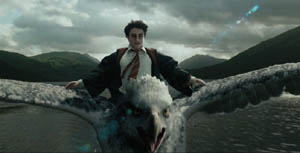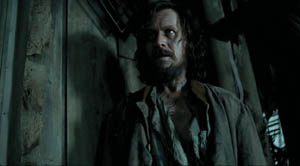|
Another rung up the ladder of quality, the third Harry Potter film is the best yet. It misses the chance to be the best of all possible iterations by still making some occasional blunders, i.e. it once again must begin by reminding us that Harry's family are one-dimensional jerks, lest we forget, but after that fortunately brief introduction, which threatens more of that old Mary-Poppins-on-crystal-meth style that sometimes made the previous films grow insufferable for the duration, it's all smooth sailing. 
Between Chamber of Secrets and this film, the three stars of the Potter franchise shot up like well-watered weeds, and their next film seems to have followed suit. This is a movie that has made the transition from being a kids' film to a film with kids in it, a significant and important distinction. After walking out of his uncle's place in an understandable huff, Harry learns of a serious upset in the magical world: notorious murderer Sirius Black has escaped from the prison of Azkaban, a sort of Alcatraz for wizards. Subsequent revelations do little to put his mind at ease; it seems that Black was a cohort of Lord Voldemort, and chiefly responsible for betraying Harry's parents to the Dark Lord. Harry himself, it seems, is a likely candidate for next on Black's list. And then, on the train ride back to Hogwarts school, Harry runs afoul of the ghostly, black-cloaked Dementors, guardians of Azkaban ostensibly searching for their lost prisoner but who seem strangely drawn to Harry. One gets the sense of a story maturing with this installment. The candy-coated feel of the first film is all but absent here, and the dangers this time around flirt with the nightmarish, not just in the deathlike appearance of the Dementors or the raving visage of Sirius Black (a wonderfully unhinged Gary Oldman), but in the issues Harry begins to have to face. Denied the chance to participate in a school outing due to a lack of a guardian's signature on the permission form, Harry is slipped a magical map by best pal Ron's troublemaking older brothers, a map which shows all of Hogwarts and the position of everyone on the grounds, with which he makes good his escape. Hidden within his father's invisibility cloak, he overhears the disturbing truth: Black is his godfather and one of his deceased parents' best friends. It's a deep cut for him. "He was their friend!" he screams in impotent rage at the thought. With his own family a bunch of worthless louts, friends rank highly on his list of strengths and priorities. The map provides additional, unanticipated revelations; like Tom Riddle's diary from Chamber of Secrets, it's a titillating and ingenious plot device that provides a crucial plot twist, and then almost immediately it twists again: either the map is sometimes wrong, or something even more mysterious is at work. 
One feels with Prisoner of Azkaban that the main course has at last arrived: the plot begins unraveling just what it was that happened to Harry's parents all those years ago, and the characters begin to connect on a greater emotional level. Structurally, it takes the natural, organic feel of film two and does it one better, though younger kids may well have a bit of difficulty keeping up with just what's happening at the end. And no one, for the entire duration of the film, ever exclaims "So you're Harry Potter!" in dumbstruck awe, which goes a long way towards humanizing his character at last, though the messianic overtones will eventually return; the set-up left little alternative. And finally, meaning no disrespect to the late Richard Harris, I must say I find Michael Gambon's interpretation of Headmaster Albus Dumbledore the preferable one. He's less directly avuncular and more impish in a way; his delivery of the simple two-word line "Did what?" near the film's close speaks volumes about the character, and the little troublemaker he likely once was. I've always had difficulty in inordinately warming to this series; I seem to never be able to recall what happens in one of these films mere days after seeing it. I don't know if this is something to do with the films or something to do with me. And as with all the films in the series, there are some stumbles here and there. While Harry is told that the Dementors affect him so strongly because he's had real horrors in his life, it's never explained why they're hassling him to begin with, and one significant clarification is allowed to go unclarified for longer than it actually would in order to maintain dramatic tension. But this is a good movie, and one rich enough with details that it rewards repeat viewings. Whatever happens afterwards is a separate matter entirely. -review by Matt Murray
|
|
||||||||